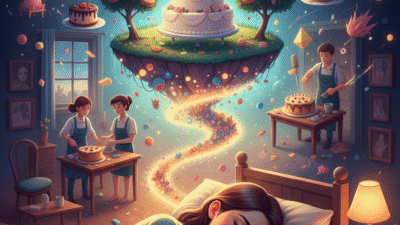If you’ve had a “dream on” dream (i.e. one that persists, lingers, or recurs), its meaning is often that your unconscious is signaling a message you haven’t yet resolved. These dreams frequently point to emotional, relational, or spiritual material demanding your attention.
Dreams that persist — what we call dream on dreams — capture our fascination because they feel urgent, as though they carry keys to our inner lives. In exploring the dream on dreaming meaning, we’ll examine what such dreams can symbolize from psychological and spiritual perspectives, dive into common variations like eating, creating, sharing, or themed event dreams, look at a concrete case study, survey cultural and historical symbolism, and finally offer psychological insight and growth practices to help you work with these dreams consciously.
What Dream-On Dreams Generally Mean: Symbolism, Psychological & Spiritual Interpretations
When people speak of “dream on” dreams, they most often refer to recurring dreams, dreams that linger in memory, or dreams whose imagery or motifs return over days or nights. Understanding their meaning involves weaving together symbolic, psychological, and spiritual perspectives.
Symbolic & Archetypal Meaning
Dream imagery is metaphorical. In the Jungian framework, recurring or persistent dream images often point to archetypal material—universal symbols or processes that your psyche is trying to integrate. Jung considered such “big dreams” as vehicles of inner transformation, guiding toward individuation. Persistent motifs may act like beacons, urging you to pay attention to unresolved issues, latent potentials, or inner tensions.
For example, in many recurring dreams, houses, stairways, or doors may represent layers of consciousness, while rivers or journeys may symbolize transitions. The repetition suggests that the psyche is not satisfied until the message is heard and integrated.
Psychological & Neuroscientific Perspective
Modern psychology tends to adopt a cautious but practical stance. Recurring dreams are often associated with unresolved conflicts, emotional stress, or unmet needs. According to Sleep Foundation, experts believe “recurring dreams result from unresolved life problems or difficult emotions” and may surface until the dreamer addresses them. Sleep Foundation
Likewise, a scientific report notes that recurring dreams often occur during periods of stress and may reflect unsuccessful attempts by the mind to integrate challenging life experiences. ScienceAlert+2PMC+2
Research also links lower psychological well-being, depression, or anxiety to more frequent or distressing recurring dreams. PMC+1
However, it’s important to remember that empirical dream research cannot definitively map particular symbols to universal meanings. The value lies more in subjective reflection and self-exploration than fixed interpretation.
Spiritual & Mystical Interpretations
In many religious, shamanic, and mystical traditions, persistent dreams are seen as messages from the soul, spirit guides, or the divine. The idea is that when an important message goes unheard, the dream returns until we act or shift.
- In Christian or New Age traditions, such a repeating dream may be viewed as an invitation to spiritual awakening, repentance, or aligning your life with a deeper purpose.
- In indigenous cultures, recurring dreams may be considered omens or guidance: elder wisdom, ancestral voices, or path-signs that persist until understood. indigenousnh.com
Thus, from a spiritual lens, the dream on dreaming meaning is often that your inner or higher self is calling you to deeper listening, transformation, or healing.
In summary: dream on dreams tend to point to unfinished internal business — emotional, relational, or spiritual — that your psyche is gently but persistently urging you to address.
Common Variations of Dream On Dreams
Below are some frequent ways in which dream on dreams manifest, and how we might interpret them — both in their positive and shadow aspects. (Always interpret in your own life context.)
Eating in a Persistent Dream
If the recurring dream revolves around eating (a meal, fruit, sweets, etc.), that act can carry rich meaning.
- Positive interpretation: You are absorbing or assimilating something new — ideas, experiences, spiritual insight. The dream suggests your inner self is working to integrate growth or nourishment that you might not be aware of yet.
- Shadow side: It may reflect emotional hunger, overindulgence, or guilt. You might be “feeding” a destructive habit or craving or neglecting healthy boundaries.
For instance, someone might repeatedly dream of eating fruit under a shady tree — symbolically, this could suggest that wisdom or nourishment is available, but needs to be consciously accepted.
Making or Creating Something
Dreams in which you create, build, paint, or sculpt in a recurring manner are often potent.
- Positive angle: This speaks to latent creativity, a life project waiting for your attention. The repetition urges you to move from inner idea to outer manifestation.
- Shadow side: The recurring nature may reflect procrastination, fear of failure, or perfectionism — you want to create but are stuck imagining rather than doing.
If, night after night, you dream of building a structure or writing a book that never quite finishes, the psyche may be nudging you to commit to that creation in waking life.
H3: Sharing or Giving the Dream Object
Sometimes the recurring dream centers on sharing or giving — gifting, offering, or revealing something.
- Positive: Signals the time is ripe to share your voice, gift, insight, or vulnerability. You may be ready to open up to relationships or step into service.
- Shadow: It may indicate overextension, fear of exposure, or loss. You could be giving too much, or fear judgment when you reveal your inner self.
A recurring dream in which you hand someone a glowing object might mirror a call to share a hidden talent or truth.
: Recurring Themed Dreams — Birthdays & Weddings
When a birthday, wedding, anniversary, or other important event recurs in your dreams, the emotional intensity is often greater.
- Birthday dreams: Often symbolize rebirth, self-renewal, or a new phase of identity emerging.
- Wedding dreams: Commonly point to union, integration, or commitment. A recurring wedding dream may reflect longing for wholeness — inner integration of conflicting parts, or a major relational shift.
For example, if one dreams repeatedly about their wedding day or a wedding they never attended, this may hint at inner integration — merging masculine/feminine energies, reconciling inner conflict, or preparing for a new relational commitment.
Evolving “Dream On” That Changes Slightly
One of the richest varieties is when a recurring dream evolves over time — shifting settings, outcomes, or emotional tone.
- The changes often mirror your inner growth or shifts in your life.
- The core motif stays the same, but new elements may appear, others fade.
For instance: someone dreams of walking down a dark corridor and always reaching a door. Over nights, the corridor becomes brighter, the door opens more easily, or the destination behind the door changes. That evolution can map to gradual personal transformation.
Real-Life Case Study: The Recurrent Key & Door Dream
Consider a person — call him Amir — who repeatedly dreamt of being inside an old house trying to find a key that opens a locked door. The twist: every time, the key shape or lock changed slightly; sometimes the door slid open, sometimes remained stuck; sometimes he found the key but didn’t dare approach the door.
Over months, as Amir began therapy and creative work, the dream evolved: the key became brighter, the path to the door clearer, and eventually — one night — he opened the door to a luminous garden.
Interpretation:
- The door symbolized deeper potential or inner self, while the key represented his capacity or readiness.
- The repeating dream nudged him to face his inner blockages.
- The evolving changes mirror his gradual emotional breakthroughs.
In Amir’s case, the dream on dreaming meaning was a direct invitation: unlock your inner barriers, step into your potential.
Cultural & Historical Symbolism of Persistent Dreams
Across times and cultures, recurring or persistent dreams (dream on dreams) have held symbolic, prophetic, or sacred significance. Below is a brief survey of how various traditions and histories have treated persistent dreams.
Ancient & Classical Traditions
- In Ancient Greece, dreams were considered messages from the gods or oracles. Temples (known as incubation temples) allowed seekers to sleep and receive divine visions. CHMC Psychologist Dubai+1
Morpheus, the classical god of dreams, is said to appear in dreams in human form, bridging divine messages and inner symbol. Wikipedia - The Greek oneiromancer Artemidorus produced Oneirocritica, a seminal guide to dream interpretation that categorized many types of recurring and meaningful dreams.
Religious & Spiritual Traditions
- In many spiritual systems, recurring dreams are given prophetic weight. Biblical examples, such as Joseph’s interpretation of Pharaoh’s dream, show dreams used as divine communication.
- In indigenous cosmologies, recurring dreams are often integrated into communal life as guidance, warnings, or ancestral voice. For example, some Native American and South American groups emphasize dreams as a bridge between realms and cultural wisdom. indigenousnh.com
- In Japanese folklore, the baku is a mythical creature reputed to devour nightmares. A person awakened from a bad dream might call on the baku to eat it — but tradition warns not to overuse that power, lest it consume one’s hopes. Wikipedia
Etymology & Symbolic Themes
- The term “dream” in ancient languages (Greek oneiros, Latin somnium) often connotes visitation, prophecy, or “something sent.”
- Symbolically, the recurrence of a dream echoes ideas of eternal return or cycles (as in some mythic thought), where inner themes persist until resolved.
- In mythic psychology, dreams are seen as “private myths” — inner stories mapping your psyche, akin to collective myths. Joseph Campbell said, “Myths are public dreams. Dreams are private myths.”
Thus culturally and historically, recurring dreams (i.e. dream on dreams) often carry weight: as messages, as spiritual invitations, or as internal myths insisting on telling their story until heard.
Psychological Insights & Personal Growth Advice
When you experience a dream on (persistent) dream, it’s a powerful opportunity for insight and growth. Here are practices and perspectives to help you work with it consciously and safely:
1. Dream Journaling
- Keep a dedicated journal by your bedside. Immediately upon waking, write down as many details as you remember: setting, colors, emotions, symbols, dialogue.
- Over time, track patterns and changes (what elements stay the same, what shift).
- Review periodically and look for metaphors, emotional arcs, or recurring motifs.
2. Reflective Questions
Ask yourself:
- What is unresolved in my waking life that matches the emotion of the dream?
- What fears, desires, or relationships are mirrored in the images?
- If the dream could speak a message to me, what would it say?
3. Mindfulness & Active Imagination
- Use mindfulness or meditation to connect with the dream emotion. Sit quietly, breathe, and imagine returning to the dream scene. Let it speak or evolve.
- Jung’s active imagination method invites dialoguing with dream figures or revisiting dream scenes in waking imagination.
4. Small Morning/Lucid Steps
- Before sleep, set the intention: “Tonight, I will remember the dream clearly and notice what it wants me to see.”
- If lucid dreaming is possible, when the dream returns you may steer or ask it questions, transforming a passive recurrence into interaction.
5. Integrative Action
- The ultimate goal is transformation. Let your dream inform changes in life: adjust relationships, take steps on a project, release what no longer serves.
- Where recurring dreams reflect stress or unresolved inner conflict, consider therapy, journaling, or inner work to complete the loop.
6. Healthy Boundaries
- Persistent nightmares of trauma should be approached gently. If a dream is distressing and persists relentlessly, seeking professional help is wise.
- Don’t force every dream to yield meaning immediately — some linger until you’re ready.
By combining curiosity, discipline, and inner courage, you can transform recurring dreams from irritants into gateways of growth.
FAQs (about dream on dreaming meaning and related ideas)
1. What exactly does “dream on dreaming meaning” refer to?
“Dream on dreaming meaning” refers to the deeper significance behind persistent, recurring, or lingering dreams — those dreams that come back, stay with you, or carry an urgency. Interpreting them involves understanding emotional, symbolic, and spiritual layers.
2. Are recurring dreams always negative or nightmares?
No. Although many recurring dreams do involve difficult or anxiety-laden themes (falling, being chased, failing), some are neutral or even uplifting — for example, dreams of flying, discovering new rooms, or revisiting a beloved place. ScienceAlert+2Psychology Today+2
3. How long should a dream persist to count as a “dream on” dream?
There’s no fixed rule — a dream that recurs over days, weeks, or even intermittently across months may qualify. The key is that it has emotional weight and demands your attention.
4. Can understanding my “dream on” dream actually help me in waking life?
Yes — many people report that working consciously with recurring dreams helps them resolve internal conflicts, make decisions, or find creative direction. Jungian and therapeutic approaches use recurring dreams as gateways to transformation.
5. What if the recurring dream is distressing or traumatic?
If a dream is persistently distressing, it may signal unprocessed trauma. In such cases, it’s wise to combine dreamwork with professional support (therapist, trauma specialist). Do not force confrontation prematurely.
6. Does every dream symbol in a “dream on” dream have universal meaning?
No — symbols are deeply contextual. While some archetypal motifs recur across humanity, most meaning comes from how the symbol resonates in your life story, emotions, and associations.
Conclusion
We began by answering directly: the dream on dreaming meaning typically points to messages your unconscious continues sending until you pay attention. These persistent or recurring dreams often reflect unresolved emotions, latent potential, or spiritual nudges you haven’t fully heard
Call to Action: Start a simple dream journal tonight. Over the next week, track any dream that lingers or repeats. Then revisit this article — compare your notes, reflect on symbolism, and welcome the wisdom waiting in your own dreams.

Sophia Hayes is an expert in dream psychology and subconscious symbolism with over 10 years of experience in spiritual research and metaphysical sciences. Her passion lies in helping readers unlock the hidden messages within their dreams to improve emotional healing and personal growth. Through her deep understanding of spiritual symbolism, Sophia provides insightful, research-based interpretations that bridge science and spirituality. At DreamingSign.com, she shares transformative guidance to help individuals understand their dreams and connect with their higher selves.




